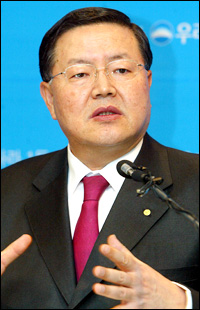|
Risky Gamble on National Pension
By Park Hyong-ki, The Korea Time
September 26, 2008
South
Korea

Park Hae-choon, NPS President
National Pension Service (NPS) President Park Hae-choon apologized to the public for mismanaging public funds which suffered steep losses through investment in stocks and bonds.
The pension fund operator and the Ministry for Health, Welfare and Family Affairs reported that the fund recorded a return of minus 1 percent by investing in equities, fixed-income securities and alternative assets both at home and abroad between January and August this year.
The loss is roughly around 2.2 trillion won or $2 billion, they said.
Feeling regretful over the loss, Park said the current situation in the global financial markets is worse than anyone had expected, and that it won't easily abate.
Park said from now on the fund will invest in safe assets approved by the NPS' management committee.
``We will do our utmost to manage the fund in a more stable way,'' said Park.
This points to reducing investment in overseas equities, and expanding investment in alternative assets such as energy development and real estate.
However, the fund will continue to increase its stakes in Seoul stocks, raising the investment portion to about 17 percent, from the current 12.7 percent of its portfolio.
It is ready to unleash some 7 trillion won into the Seoul stock market should it further tumble on the global credit crunch toward the year's end.
Mindful of this, Park asked the public to view the fund's investment strategy from a long-term perspective, indicating that it will stick to its original plan of boosting investment in stocks, while reducing bond holdings.
``The committee has decided not to change its initial plan, and go on and raise stakes in equities for now,'' said Kim Moon-soo, a senior NPS investment officer.
He added that members of the investment management committee will meet next month to review its plan, and perhaps adjust it in accordance with the current circumstances surrounding the financial markets.
The NPS mentioned that the fund has played relatively safe compared with other global pension funds such as Japan's Government Pension Investment Fund (GPIF) and the California Public Employees Retirement System (CalPERS), whose stock investments account for more than 50 percent of their portfolios on average.
In the first six months of this year, CalPERS recorded a return of minus 5.2 percent, while GPIF was minus 4.1 percent, compared with the NPS' 0.27 percent on average.
The NPS, last July, said it will gradually increase the portion of its equity investment to 40 percent by 2010, citing that stocks offer more handsome returns than bonds over the long-term.
It will eventually reduce its bond investment from 80 percent to 50 percent as well, while raising the portion for alternatives from 3.5 percent to 10 percent.
Analysts agree that it is making the right move by enhancing its exposure to stocks.
``Over the long-term, investment in stocks offer not only better returns, but can also help hedge against inflation, which is likely to grow going forward,'' said Kang Sung-won, a researcher of Samsung Economic Research Institute. ``There is a limit to hedging when you only invest in bonds.''
However, he said the NPS should be more flexible when it comes to deciding which assets to invest in.
The researcher believes its plan is ``too rigid.''
``It is always nice to have an ultimate investment goal, but one should be flexible and consider all possible options going forward,'' said Kang. ``It isn't wise just to target 40 percent and reach for it blindly.''
In addition, the pension fund took a heavy beating from investing in distressed assets of five U.S. financial firms.
It said the fund invested over 450 billion won in securities of investment banks, an insurer and mortgage providers ― Lehman Brothers, Merrill Lynch, AIG, Fannie Mae and Freddie Mac.
Between July last year and this month, the pension fund lost some 120 billion won from such investments as they either have gone bust or become nationalized by a government takeover.
The NPS is the fifth biggest pension fund, following Japan's GPIF, Norway's Government Pension Fund, the Netherlands' All Pension Group and the U.S.' CalPERS, according to Pensions & Investments and the NPS.
More
Information on World Pension Issues
Copyright © Global Action on Aging
Terms of Use |
Privacy Policy | Contact
Us
|



